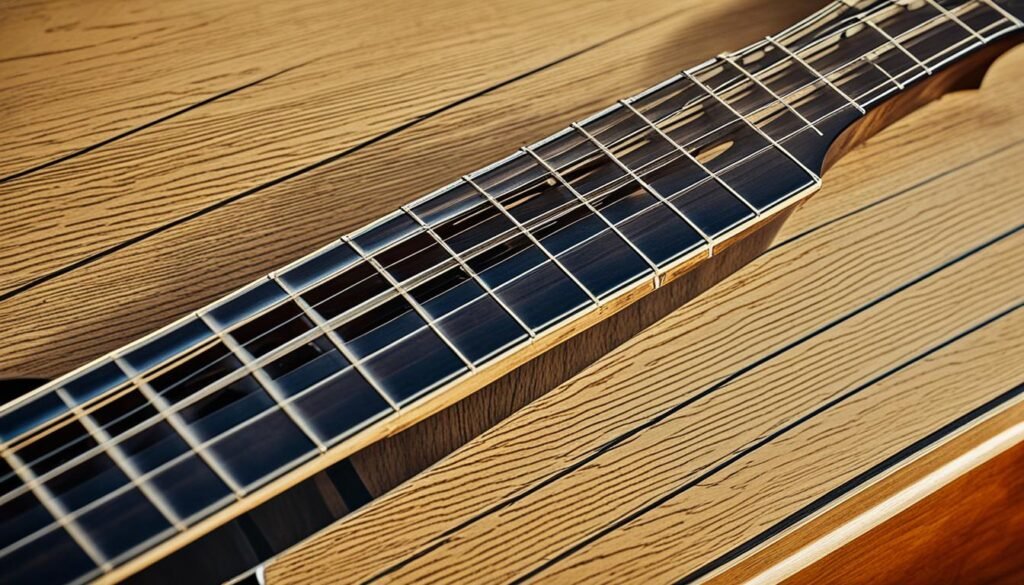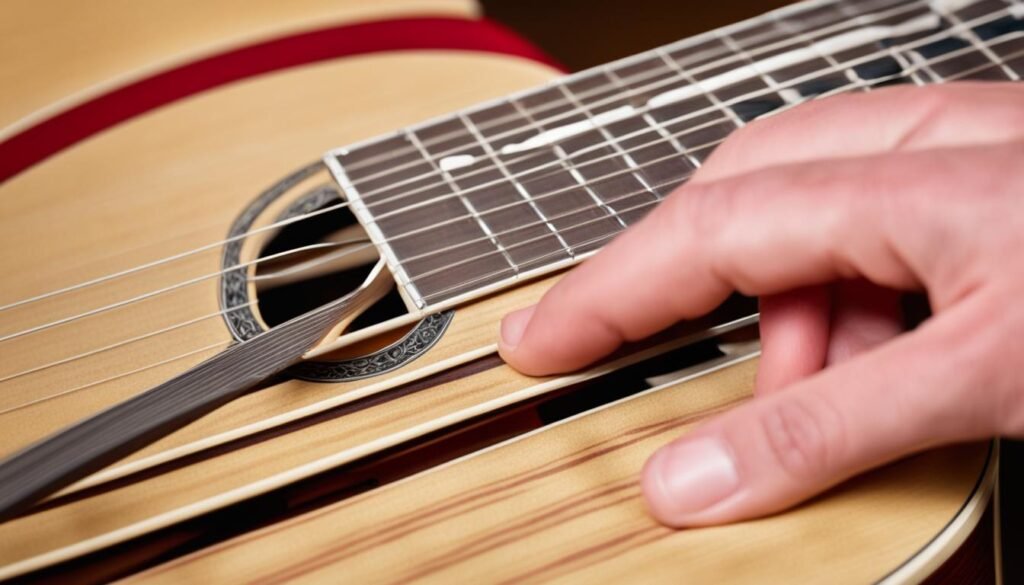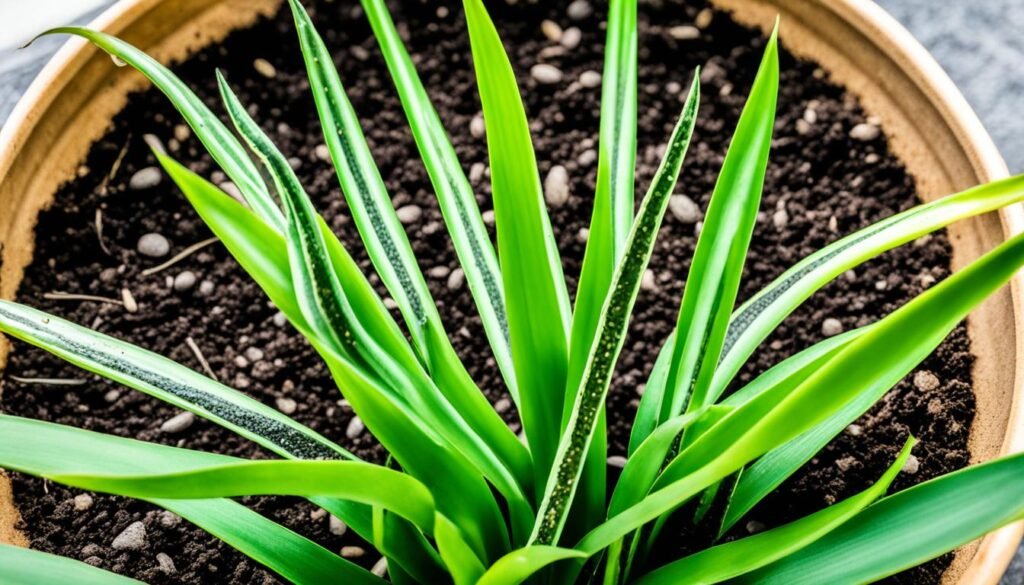Quick Facts – Fingerstyle Guitars 2025
- Fingerstyle guitars offer better control, clarity, and tonal balance.
- Body size, tonewoods, nut width, and scale length greatly affect playability.
- Taylor, Martin, Gibson, and Collings lead the premium fingerstyle market.
- Budget picks like the Yamaha FS800 deliver strong performance at lower cost.
- A wide nut and shorter scale improve comfort during fingerpicking.
- Accessories such as thumbpicks, humidifiers, and quality strings enhance sound and longevity.
Are you exploring fingerstyle guitar for the first time? Or are you already a dedicated fingerstyle player aiming to upgrade your sound? Either way, you’re in the right place. Fingerstyle guitar blends melody, rhythm, and harmony through direct contact with the strings. Because of that, choosing the right guitar makes a noticeable difference in tone, clarity, and comfort.
In this guide, we’ll walk through why fingerstyle guitars matter, the key features to look for, and the best fingerstyle guitars of 2024, including both premium and affordable options.
Let’s begin your journey toward better tone and smoother playing.
Why Choose a Fingerstyle Guitar?
Fingerstyle guitars provide several advantages that help you play more expressively. Additionally, these guitars respond beautifully to lighter touch, subtle dynamics, and intricate techniques.
Greater Control and Precision
Instead of using a pick, fingerstyle players rely on fingertips or nails. This allows you to:
- Pluck individual strings cleanly
- Create layered patterns
- Add rhythmic slaps and percussive textures
- Bring out melodic lines while supporting harmonies
Because of this, fingerstyle guitars are built to emphasize clarity and note separation.
Enhanced Comfort
Most fingerstyle-friendly guitars feature:
- Slimmer bodies
- Wider nuts
- Comfortable neck profiles
These elements make it easier to maintain control during longer sessions.
Balanced and Rich Tone
Fingerstyle guitars usually offer:
- Clear highs
- Focused mids
- Warm, controlled bass
- Since fingerstyle requires every note to stand on its own, tonal balance is essential.

(All images are AI-generated)
What to Consider When Choosing a Fingerstyle Guitar
Before investing in a new guitar, consider the following factors. These aspects will significantly influence playability and sound.
Tonewoods
Tonewoods dramatically affect resonance:
- Spruce = bright, responsive
- Cedar = warm, sensitive to softer touch
- Rosewood = complex overtones
- Mahogany = focused and woody
Choose based on the sound profile you prefer.
Body Size & Shape
Fingerstyle players often gravitate toward:
- OM (Orchestra Model)
- Grand Auditorium
- 000 body shapes
These sizes offer comfort, balance, and responsive tone.
Neck Shape, Scale Length & String Spacing
Look for:
- Nut width 1.75″ or more
- Shorter scale (24.75″ or less) for reduced tension
- Comfortable C-shaped or low-profile neck
These features make intricate fingerpicking easier.
Budget
Set a realistic budget. You’ll find excellent guitars at all levels, from entry-level to premium builds.
Best Fingerstyle Guitars of 2025
After reviewing performance, build quality, and tonal clarity, these guitars stand out.
1. Taylor 814ce
A top choice for modern fingerstyle players.
Highlights:
- Grand Auditorium body
- Exceptional clarity and shimmer
- Expression System® 2 pickup
- Superb responsiveness
This model is excellent for both studio and stage.
2. Martin OM-28
A legendary fingerstyle guitar with balanced tone.
Highlights:
- Solid Sitka spruce top
- East Indian rosewood back and sides
- Comfortable OM body
- Warm, expressive sound
Perfect for players who want tonal depth and traditional craftsmanship.
3. Gibson J-45
Ideal for players who crave character and warmth.
Highlights:
- Full-bodied sound
- Round-shoulder dreadnought shape
- Excellent low-end richness
Although larger than typical fingerstyle models, it offers a warm response.
4. Collings OM2H
A boutique-level instrument for serious players.
Highlights:
- Sitka spruce top
- Indian rosewood back and sides
- Clear, ringing sustain
Because of its handcrafted build, every note feels intentional.
5. C.F. Martin OM-42
Premium tone meets refined aesthetics.
Highlights:
- European spruce top
- High-grade rosewood
- Complex overtones
- Stunning cosmetic details
A luxury option for advanced finger stylists.
Key Features to Look For in a Fingerstyle Guitar
Here’s what you should prioritize:
- Comfortable neck profile for smooth transitions
- Shorter scale length for softer tension
- Wider nut width for greater string spacing
- Balanced tonal response for clarity
- Reliable pickup systems if you perform
Because fingerstyle emphasizes nuance, these features matter more than they do in strumming.
Budget-Friendly Fingerstyle Guitars
You don’t need to overspend to enjoy fingerstyle.
Yamaha FS800
A fan favorite for beginners.
- Clear tone
- Comfortable smaller body
- Outstanding value
Epiphone Masterbilt DR-500MCE
Solid wood is built at a reasonable cost.
- Warm tone
- Good projection
- Built-in electronics
Alvarez Artist Series AF30
Designed for fingerstyle clarity.
- Focused sound
- Affordable price
- Comfortable neck
These guitars offer excellent performance without breaking the bank.
Tips for Fingerstyle Guitarists
Want to improve quickly? Try these:
- Maintain proper finger posture
- Practice slow, consistent patterns
- Alternate thumb techniques for different tones
- Experiment with percussive taps and harmonics
- Practice finger independence exercises
- Record your sessions to track progress
- Study greats like Tommy Emmanuel and Sungha Jung
Minor improvements in technique create significant differences in tone.
Must-Have Fingerstyle Accessories
Enhance your setup with:
- Fingerpicks and thumbpicks
- A comfortable guitar strap
- A capo for alternate tunings
- A padded gig bag or hard case
- High-quality light or extra-light strings
- A guitar humidifier for wood protection
These add-ons make your guitar sound better and last longer.
Fingerstyle Guitar Maintenance Tips
To keep your guitar in great shape:
- Clean after every session
- Maintain proper humidity
- Store in a safe case
- Change strings regularly
- Schedule professional setups
- Handle with care
Good maintenance keeps the tone consistent.

(All images are AI-generated)
FAQ
A good fingerstyle guitar has a wider nut, a comfortable neck, and a balanced tone that lets each note ring clearly when played with fingers.
Yes. A wider nut creates more space between strings, making complex patterns easier to play.
OM, 000, and Grand Auditorium body styles are common choices because they give a balanced tone and feel comfortable during long sessions.
Beginners can start with a clear-sounding, comfortable guitar such as the Yamaha FS800. Advanced players may prefer models from Taylor, Martin, or Collings for refined tone.
Spruce gives a bright, quick response, while cedar offers a warm tone that reacts well to a softer touch. The best option depends on your sound preference.
A shorter scale lowers tension, making fingerstyle patterns easier and more comfortable for long practice sessions.
If you perform or record, built-in electronics help you get a clear, consistent tone. Players who stay unplugged may not need them.
Yes. Models like the Yamaha FS800, Epiphone Masterbilt, and Alvarez AF30 offer clear tone and comfort at a lower cost.
Many fingerstyle players change strings every four to eight weeks, depending on how often they play. Fresh strings improve clarity and response.
Thumbpicks, fingerpicks, a capo, light strings, a humidifier, and a quality case can help protect the guitar and improve your playing setup.
DISCLAIMER:
This blog post is for informational purposes only. We make every effort to provide accurate, current, and well-sourced information, but we cannot guarantee its completeness or absolute accuracy.
All images, videos, and logos used on bestfordaily.com belong to their respective owners. We aim to credit and reference them appropriately. If you are the rightful owner and wish to have your image, video, or logo removed, please contact us.
Author
-

Hey there! I'm Andrew Reed, and I live for the thrill of writing reviews. Dive into my world at bestfordaily.com, where I unpack stories behind products and experiences. I'm all about sharing my unique take on things, infusing each review with my youthful enthusiasm and a dash of social flair. Join me on this exciting journey—I promise you won't just read reviews; you'll experience them!
View all posts






